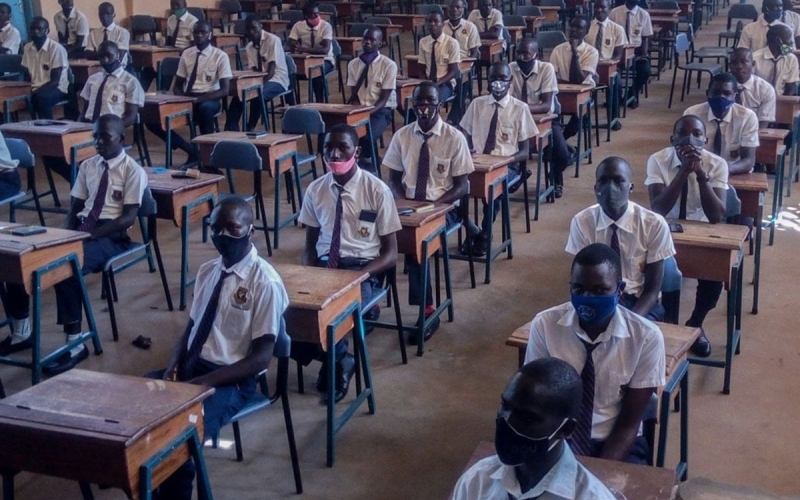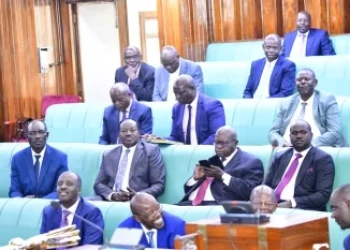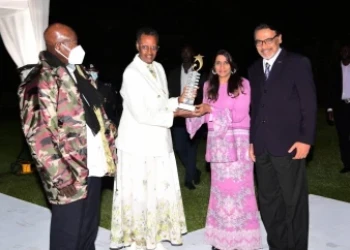
The Uganda National Examination Board- UNEB, has noted that the rate of failure in the 2022 Uganda Certificate of Education - UCE has reduced, according to Uganda Certificate of Education Examination results released today.
According to the results released today by the UNEB Executive Secretary Dan Odongo, there has been a one percentage point drop in failure rates from 18,415 in 2020 to 15,756 presenting 5.6 percent and 4.6 percent respectively.
The results also indicate that there were more candidates sitting UCE in 2022 than in 2020 by 16063 representing a 4.8 percentage increase. In 2022, there were 349459 as compared to 333396 candidates. The results also show that boys performed better than girls overall.
According to the results, there were 46,667 candidates passing in grade one compared to 39,968 in 2020. On the other hand, 76,745 representing 22.2 percent passed in grade two as compared to 69,782 [21.2%] in 2020. 88,690 [25.7%] candidates passed in grade three compared to 81428 [24.7] in 2020 while 117,837 [34] passed in grade four compared 120,055 [36.4] in 2020.
“There is an improvement in performance in the large entry subjects except in Christian Religious Education, Biology and Commerce. Mathematics showed better performance at the Distinction level, but declined overall. English Language improved at credit and overall Pass levels, but declined at the distinction level.
The results also revealed that performance in Biology continued to decline as seen in the last few years. Worth noting is that, performance in Physics and Chemistry has improved, although the overall pass levels are still low. Over 40% of the candidates have not passed the two subjects.
However, the results also show that there was overall poor performance in all the science subjects although biology and chemistry registered the worst performance with 40 percent of the candidates failing to get even pass eight.
Odongo attributed this to schools concentrating on the theory and neglecting the practical aspects of the subject. For her part, Prof. Mary Okwakol, the UNEB chairperson said that although there has been sustained government effort to improve science performance, these interventions are yet to produce the desired outcomes.
“The board applaud the efforts by government to improve performance in sciences…our hope is that these interventions translate into better performance by candidate,” says Okwakol.
In last year’s exams, for the first time, UNEB examined Chinese Language and out of 134 candidates who registered 124 [92.5%] of them passed. Chinese joins languages such as; French, German, Arabic, Latin and Kiswahili to be examined.
The results also show that female candidates performed better than males in English Language while the males performed better in science subjects. Uneb also once again attributed the failure overall to lack of command in the English language in which most of the exams are set.
“The challenge of language deficiency is reflected in performance in other subjects, where Chief Examiners continue to report failure by the candidates to interpret the demands of the tasks set, failure to follow instructions, misunderstanding key words used in the stem of a question, and generally poor language expression,” says Odongo.
Meanwhile, Uneb also said there was a reduction in examination malpractice due to the strict measures in place. However, there were cases of malpractice especially in subjects such as; Physics, Chemistry, and Mathematics, with; external assistance, collusion among candidates, impersonation and script substitution as the common cases. These malpractices resulted into the withholding of examination results of 1,035 candidates. "Examination centres from which results are withheld will be notified through their portals,” says Odongo.
In her speech, Janet Kataha Museveni, the minister of Education and Sports said they are determined to ensure that they defeat the practice of cheating exams. Museveni also said that her Ministry acknowledges the poor performance in Biology, which has been re-occurring through subsequent releases of the UCE results.
“This matter is currently being addressed through the intervention of Curriculum Reviews. These Reviews aim at among other things doing away with obsolete information, reducing subject content overload and contact hours in the classroom, so as to create time for research, talent development and creativity among other things. This we hope will help improve the learners' performance. Similarly, the Ministry notes that this year the overall performance in the Science subjects that are compulsory is not yet satisfactory although there is some improvement. Government is committed to promoting the teaching and learning of science subjects as you know. The Ministry of Education and Sports, will look into this matter and where necessary re-examine our policies to address areas of concern in this regard,”says Kataha Museveni.
Comments (0)
📌 By commenting, you agree to follow these rules. Let’s keep HowweBiz a safe and vibrant place for music lovers!












